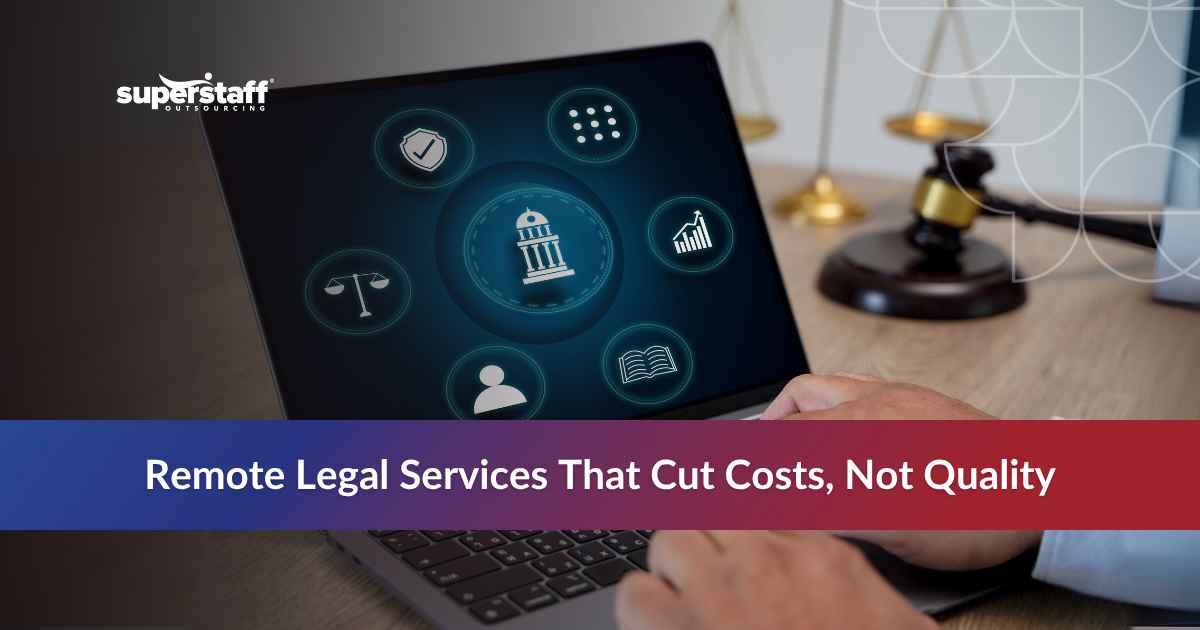
Legal teams are under pressure to deliver results while keeping costs manageable. Instead of adding full-time staff or overloading existing teams, many firms are choosing remote legal services to maintain productivity and reduce spending. This model provides access to qualified legal professionals without the need for in-office support or long-term contracts.
Remote legal professionals can take on tasks that are time-consuming but essential. These services give firms more control over their resources while staying compliant with legal standards. With careful planning, legal teams can scale up without breaking the budget.

Why More Firms Are Using Remote Legal Services
Remote legal services are reshaping how law firms manage time, people, and resources. Nearly 90% of firms now allow remote work; 44% of junior lawyers would switch roles for more flexibility.
This section explains how firms benefit from this approach beyond just lowering expenses.
1. Lower Operating Costs
Firms no longer need to maintain large office spaces or invest in additional infrastructure. Remote staff work off-site, reducing overhead tied to equipment, utilities, and supplies.
2. Scalable Workflows
Projects vary in scope and demand. With remote legal services, firms can scale staffing levels up or down depending on case volume, without making long-term hires.
3. Access to Specialized Talent
Some tasks require specific experience. Remote professionals allow firms to bring in subject matter experts, such as those familiar with IP, real estate, or regulatory law, without committing to full-time roles.
4. Reduced Training Time
Legal process outsourcing companies often supply professionals who are already trained in standard procedures. This reduces the need for onboarding and accelerates project delivery.
5. Flexible Payment Models
Hourly, per-project, or monthly packages give firms more control over budgeting. This helps track expenses and avoid the high cost of salaried roles with benefits.
Common Tasks Handled by Remote Legal Professionals
Remote teams can support legal work that requires focus, accuracy, and documentation. The list below shows the most common areas of support.
- Document Review: Review contracts, discovery files, and internal policies for accuracy and relevance.
- Legal Research: Provide background on case law, regulations, and precedent to support litigation or compliance.
- Drafting Support: Assist with basic agreements like NDAs, service contracts, and policy updates.
- eDiscovery Tasks: Organize and process digital files for legal review or evidence tracking.
- Transcription: Convert meeting audio or court recordings into structured, readable documents.
These tasks often follow set procedures, making them ideal for remote legal services. They also free up in-house teams to focus on more strategic work.
What To Check Before Hiring Remote Legal Help
Hiring remotely offers flexibility, but choosing the wrong provider can lead to problems. Use the following checklist when assessing potential partners.
1. Experience and Legal Knowledge
Make sure the provider has experience in your legal field. Ask for references or examples of past work to confirm their ability to meet your needs.
2. Data Security Practices
Security should be non-negotiable. The provider must follow strong data protection rules, including encryption, password management, and secure access systems.
3. Compliance with Legal Boundaries
Remote professionals should not give legal advice unless they are licensed in your jurisdiction. Make sure their role stays within the limits of legal support, not representation.
4. Workflow Transparency
Ask about how work is submitted, reviewed, and delivered. A reliable provider will offer tracking systems, deadlines, and structured feedback processes.
5. Contracts and Legal Clarity
Review the contract to ensure it includes service levels, non-disclosure terms, and clear accountability. Include jurisdiction, liability clauses, and options for resolving disputes.
Supporting Roles Like Virtual Legal Assistants
Aside from legal tasks, some remote professionals offer administrative help. A virtual legal assistant can support scheduling, file organization, and billing prep—common tasks that take time away from client work.
They are especially useful for solo lawyers or small firms. By handling background work, they help firms stay organized and reduce time spent on logistics. This also limits the need for full-time staff in entry-level roles.
How Remote Legal Teams Reduce Law Firm Costs
Outsourcing legal support work makes budget planning easier. Remote services allow firms to avoid the rising costs of employee benefits, equipment, and long-term leases. Since services are paid per task or project, there’s no waste on unused labor.
Many firms use remote services to avoid the costs of hiring for temporary surges in workload. During mergers, audits, or litigation prep, teams can expand for a few weeks or months without committing to permanent hires. This makes spending predictable and aligned with real workload needs.
Making Remote Legal Services Work Smoothly
To get the most from remote legal services, legal teams should build processes that support clarity and consistency. These steps make collaboration easier and help prevent delays.
1. Set Clear Expectations
Before any work begins, share detailed instructions and deadlines. This reduces back-and-forth communication and improves turnaround times.
2. Use Secure Platforms
Avoid sharing documents over email. Use password-protected platforms or cloud systems with access control settings to protect sensitive files.
3. Check Work Regularly
Schedule weekly or biweekly reviews to assess work quality. Feedback helps remote teams make adjustments and stay aligned with firm standards.
4. Assign a Point of Contact
Designate one person in your firm to coordinate with the remote team. This prevents confusion and ensures tasks are delivered in order.
5. Keep Scope Focused
Assign tasks that are clear and well-defined. Avoid vague requests or multi-step projects unless you’ve worked with the provider before.
Smart Legal Staffing, Smarter Business Spending
Remote legal services provide a practical way to meet legal demands while keeping budgets in check. They offer scalable staffing, flexible pricing, and access to professionals who can support legal departments without heavy commitments.
Whether you need support with document review or want to hire a virtual legal assistant for administrative work, this approach keeps operations lean and focused. Trusted legal process outsourcing companies can supply qualified talent while helping you reduce risk and maintain compliance.
Make Better Use of Legal Budgets Today
Remote legal services help firms grow without stretching internal teams. They support predictable spending, allow for quick staffing changes, and help focus internal resources where they matter most.
If you’re wondering how remote legal teams reduce law firm costs, start by reviewing the tasks that eat into your staff’s time. You may find that a few simple shifts toward remote support can improve efficiency without sacrificing quality or control.
SuperStaff offers tailored remote legal services to help your firm handle everything from document review to administrative tasks. With our skilled talent pool and flexible support model, you can streamline legal operations while keeping costs manageable.






